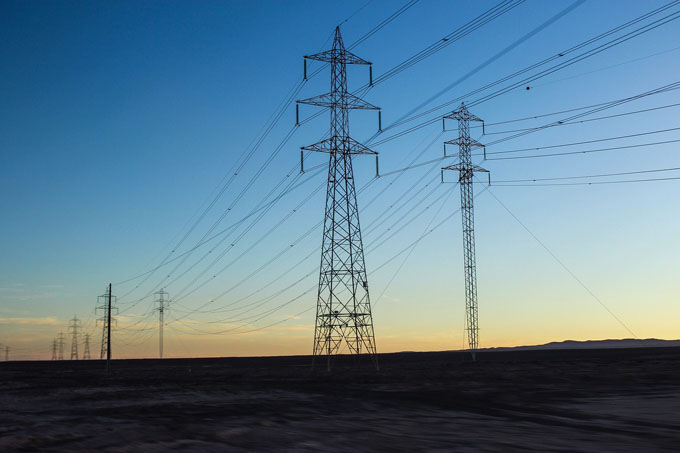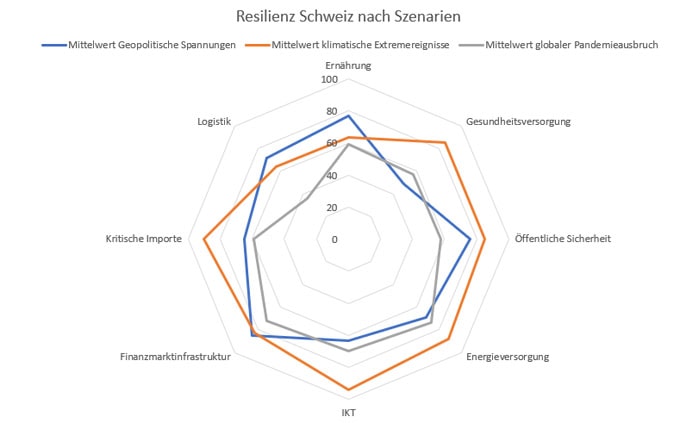Basic economic supply largely guaranteed in the event of a crisis
Pandemics, geopolitical tensions, climate change: The Swiss economy is repeatedly exposed to drastic events that can cause major damage in an interconnected world. The auditing and consulting firm Deloitte has examined the crisis resistance and defense capacity of the Swiss economy for three realistic scenarios and validated them with external experts.

The auditing firm Deloitte has published a new resilience barometer for the Swiss economy. For this purpose, the authors divided the economy into eight areas with further sub-areas. Each sub-sector was then examined for its resilience to three selected scenarios. The scenarios chosen were firstly a highly contagious and disease-causing pandemic, secondly an aggravation of global political tensions with the formation of blocs, an increase in sanctions and the disruption of supply chains, and thirdly a further aggravation of climate change with extreme climatic events such as heat waves or floods. All these scenarios can be assumed to pose a considerable risk to basic supply.
Significant differences between the economic sectors
The study reveals significant differences between the eight areas that are central to the functioning of the economy: The financial market infrastructure, for example, is gratifyingly resilient. The currently much-discussed energy supply shows certain weaknesses, but the basic supply can largely be maintained. Healthcare is less resilient, and would suffer considerable restrictions in the Global Pandemic Outbreak and Geopolitical Tension and Bloc Formation scenarios. Logistics is also highly vulnerable due to globalization, especially in light of the Geopolitical Tensions scenario. "Where people are doing important work locally, it becomes difficult in the event of a crisis," said Ralph Wyss, partner and head of the defense, security and justice industry practice at Deloitte Switzerland.
Logistics as a core must be strengthened
While certain gaps in healthcare provision are unsurprising in the event of a severe pandemic, the resilience of logistics may well be strengthened. It is clear that the Swiss economy is heavily dependent on global supply chains that are not resilient to either a pandemic or an increase in political tensions. "Functioning logistics is at the heart of the economy. Companies and associations should therefore quickly address the weaknesses revealed in the study," explains Ralph Wyss.
Resilience strongly dependent on scenario
Of the three scenarios analyzed, a pandemic has the strongest impact on the Swiss economy - even though Switzerland and the whole world have already gained a lot of experience with Covid-19: "It is very difficult to build up better resilience in the event of an even more contagious pandemic. Ultimately, in such a case, healthy people help sick people. As long as technology does not significantly substitute for people, the weakness in the system will remain," says Ralph Wyss.

The increase in extreme climatic events is having a less pronounced, but nevertheless gradually noticeable, impact. In addition to logistics, these are also having an increasing impact on food supplies. "In the next three to five years, extreme climatic events are not expected to jeopardize the basic supply of the Swiss economy. Forecasts further into the future are very much dependent on the success of the international community in halting the global rise in temperature," says Céline Neuenschwander, researcher at Deloitte Switzerland and project leader of the study.
Public safety depends heavily on the militia system
Public safety is largely resilient to crises in all scenarios. One outlier is the medical sector, which suffers severe restrictions in the pandemic scenario. The army, as the last resort for maintaining public security, has difficulties, especially in the Geopolitical Tensions scenario, as armaments are now difficult to procure. In addition, numerous institutions such as the army, civil defense, crisis teams, and even the fire department are based on the militia system almost throughout the country. "As the duration of a crisis progresses, the people responsible in a militia function will have to return to their traditional professions. This is the big challenge for our otherwise well-functioning militia system," says Ralph Wyss.
Financial Market Infrastructure and Energy Supply Pleasingly Resilient
On the positive side, financial market infrastructure and energy supply both show high resilience scores in the overall evaluation. However, in the event of strong geopolitical tensions and intensified bloc formation, the resilience of Switzerland's energy supply rapidly declines. "Given the increasingly digitalized economy, a vulnerable energy supply is problematic. Currently, most companies have therefore taken measures to understand their own consumption more precisely and are preparing to reduce power consumption in the short term and plan how to deal with contingency and power interruptions," says Ralph Wyss.
The study deliberately distinguishes between maintaining the current comfortable situation and a basic supply that only provides what is necessary. "It is gratifying to see that, with few exceptions, the Swiss economy can ensure a good basic supply. However, the weaknesses identified show that companies and authorities need to address the issue of resilience broadly. While the current focus on energy supply is important, it does not do justice to the breadth of the challenges ahead," concludes Ralph Wyss.
Source: Deloitte









